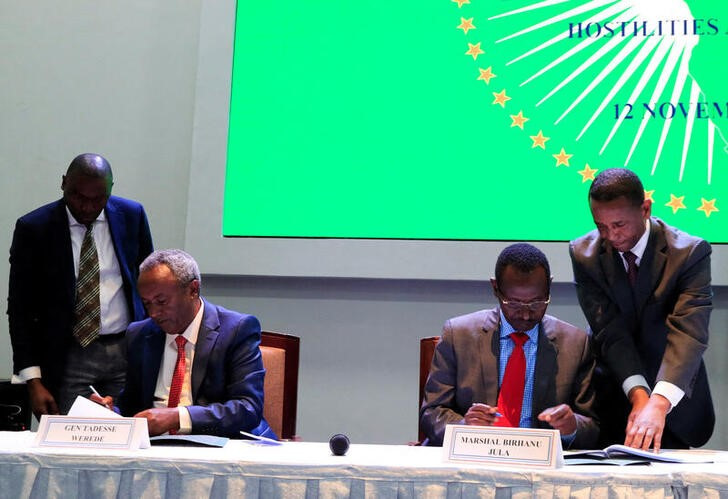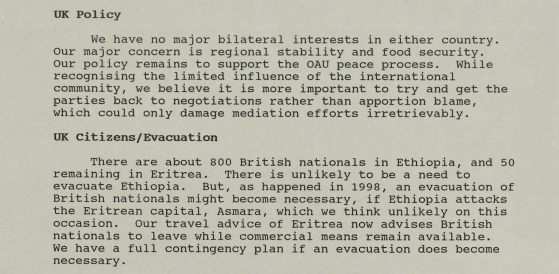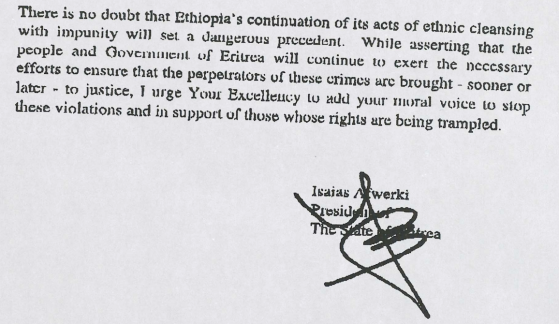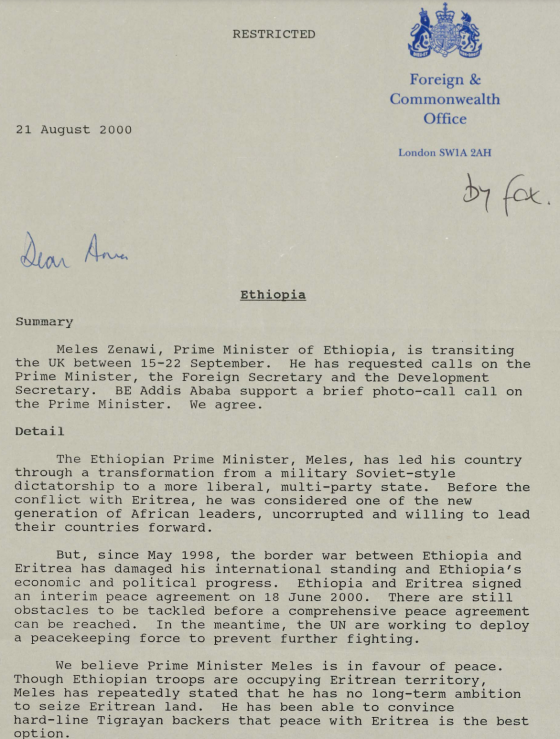EPDP Editorial
Political programmes of the existing Eritrean pro-democracy and change forces reveal that they have more in common than what divides them. The topmost commonly held fundamental agendas that unite them include the following:
1. Identifying the ruling clique as their chief enemy; responsible
2. Preserving Eritrean sovereignty;
3. Removing the repressive regime;
4. Replacing the existing tyranny by a democratic constitutional system of governance that ensures the supremacy of the citizenry.
Upholding these objectives as they are, the political forces will have all the opportunity of raising their different viewpoints among the people while giving a final shape to the country’s constitutional structure.
The differences among Eritrean political formations can in no way prevent joint action against the repressive common enemy at home. The differences can be seen as choices for the people to consider in post-dictatorship setting. However, lack of proper handling and full understanding of the issues by their propagators could make them those differences look harmful and everlasting while they are not. Those of us who have been calling for joint work for joint victory do indeed appreciate that the seemingly big differences between organizations are not really big but easy to overcome. In the meantime, trying to put aside one’s differences and giving priority to the points of common understanding in order to launch joint work is not proving to be that easy, as seen in the case of the Eritrean opposition. We should not forget that putting it into action requires taking bold decisions and persistent determination to make joint work happen.
In other words, realizing our multiple proposals for joint work are facing hurdles because joint action calls for bringing closer the perceived points of disagreement and creating in a responsible manner a central space that accommodates all stakeholders. The key factors that prevent us from realizing joint work are:
1. General lack of not setting one’s priorities;
2. Failure to have common understanding of the primary enemy;
3. Failure of understanding the roles and freedoms of organizations as separate entities as well as members of the coalition for joint work; and
4. Not giving priority to people and country over one’s political formation.
Although difficult, it indeed is possible to resolve these differences and reach common understanding for joint action. But, we in the Eritrean opposition camp struggling for change in Eritrea, have not yet acquired the capabilities to take the right steps.
In the call for joint work, there should not be one who invites and another coming as an invited participant. No. It is important that all known stakeholders be part of the initiative and hold responsibilities from the get-go. The issue of unity or joint work cannot be simplified as ‘a trial and error’ matter. It is a strategy that requires high consideration and careful handling because it is the basic means that can clear the path for the aspired political change.
It was springing from this understanding and importance that the Eritrean People’s Democratic Party (EPDP) has been issuing proposals at its congresses and doing all what it can to promote the idea. For the EPDP, unity and joint action proposals for regime change and the establishment of democratic governance are much beyond the capabilities of one party or organization.
We fully understand that closing the gap and creating a platform for joint work between organizations with long simmering differences and mistrusts requires sufficient time in addition to effective and responsible capabilities. But it is absolutely unacceptable to see our forces for change losing time by hiding behind indefensible excuses instead of facing the timely challenges head-on. Waiting for others to respond sometimes proves to be tiresome and frustrating, but there is no choice other than steadfastly trying to realize the right path for change.
Understandably, success through joint work depends on the capabilities of the forces that come together for a joint work and the outcome is the sum total of their inputs. If the individual members making up the coalition lack capabilities, their coming together will remain just nominal and incapable of doing the required work.
A framework for joint work should not be understood to mean end of the work by the forces capable in immensely contributing in the struggle. Prioritizing and organizing in a responsible way the specific contributions of the parties, movements and organizations forming the joint platform is very essential. Instead of promoting one issue at a time, it is possible to conduct multiple related tasks alongside each other. For example, while working on how to remove the tyrant regime in Asmara, it is also important to work at the same time on how to guarantee state sovereignty, unity of the people, the tasks required in the transition period, and the modalities of popular participation in the various tasks.
The current developments in our region do put the PFDJ clique in corner and encourage the forces of change to do more. The unwarranted involvements of the repressive regime in regional matters, and particularly its interferences in Ethiopia, have further exposed its anti-people cruelties and excesses.
In spite of all the efforts exerted so far, our opposition camp has gravely failed to respond to the question of unity and joint work. This failure demonstrates that we have been handling the issues in a wrong way. Our past shortcomings are deeply regrettable. However, it is now time to learn from past mistakes and do what is right. It will be sad if we do not learn from our past and mend our ways in the future. Therefore, our old motto of “Joint struggle for joint victory” is still alive and without other alternative.
العمل المشترك من اجل النصر المشترك!
Written by حزب الشعب الديمقراطي االرتريርእሰ-ዓቀጽ ሰዲህኤ
ኣብ መንጎ ፈደራላዊ መንግስቲ ኢትዮጵያን ክልል ትግራይን፡ ንክልተ ዓመታት ዝተኻየደ መሪር ደማዊ ውግእ ካብ ዞባና ሓሊፉ ኣህጉራዊ ኣሻቓሊ ኣጀንዳ ኮይኑ ከም ዝጸንሐን ጌና ኣብ መስርሕ ምቁራጹ ዘሎ ናይ ቀረባ ተዘክሮ እዩ። ናይዚ ውግእ ተጋጠምቲ ኣካላት ብግሁድ፡ በቲ ሓደ ገጽ ፈደራላዊ መንግስቲ ኢትዮጵያ፡ ጉጅለ ህግደፍን ሓይሊ ኣምሓራን ክኾኑ እንከለዉ፡ በቲ ካልእ ወገን ድማ ሓይልታት ምክልኻል ትግራይ ኮይኖም ጸኒሖም። ብድሕሪ ነፍሲ ወከፎም ተሰሊፎም ዘዕጥቑን ዘስንቑን ሓይልታት ኣይነበሩን ማለት ግና ኣይኮነን። እዚ እቲ ወተሃደራዊ ኣሰላልፋኡ ኮይኑ፡ ኣብ ዲፕሎማስያውን ፖለቲካውን መዳያት እውን ክንጸባረቕ ጸኒሑ እዩ።
ውግእ ምስተጀመረ ገለ ወገናት ካብቶም ተዋጋእቲ ዝድግፍዎ ክስዕረሎም፡ ናይ ንዋትን ሞራልን ደገፍ እናሃቡ ናብ ሰዓራይን ተሰዓራይን እንዳደፍኡን ከጋድዱን ተራእዮም እዮም። ብኣንጻሩ ካለኦት ወግናት፡ መሪር ሳዕቤንን ዕንወትን ናይቲ ውግእ ተገንዚቦም፡ ውግእ ደው ኢሉ ክልቲኦም ወገናት ተዓወቲ ዝኾንሉ መፍትሒ ንክርከብ ዘኽእል ዘተ ሰላም ክካየድ ተጽዕኖ ክፈጥሩን ክምሕጸኑን ጸኒሖም። ምክፍፋል ኤርትራውያን ኣብ ኣረዳድኣን ኣፈታትሓን ናይዚ ውግእ ካብዚ ወጻኢ ዝረአ ኣይነበረን። ሰልፊ ዲሞክራሲ ህዝቢ ኤርትራ (ሰዲህኤ)፡ ኣካል ናይቲ “ውግእ ተቛሪጹ ሰላማዊ መዋጸኦ ክርከብ፡ ኩሉ ዘጋጠመ ሰብኣዊ ቅልውላው ብቕልጡፍ ክሓውን ተሓተቲ ኣብ ቅድሚ ሕጊ ክቐርቡን” ክጽውዕ ምጽንሑ፡ ድሕሪ’ቲ ውግእ ምጅማሩ ብተደግጋሚ ብትካላቱ ከውጸኦም ዝጸንሐ መግለጽታት ህያው ምስክር እዮም።
ድሕሪ ናይ ክልተ ዓመታት ንብዙሓት ዘደንጸወ፡ ብሚልዮን ዝግመት ህይወት ሰባት ዘጥፈአን ብቢልዮናት ዶላር ዝግመት ክሳራን ዕንወትን ዘስዓበን ደማዊ ውግእ፡ ፈደራላዊ መንግስቲ ኢትዮጵያን ክልል ትግራይን ቅድም ኣብ ደቡብ ኣፍሪቃ ደሓር ድማ ኣብ ኬንያ ውዕል ሰላም ተኸቲሙ። እቶም ከተምቲ ናብቲ ስምምዕ ንክበጽሑ፡ ናይ ዝተፈላለዩ ግዱሳት ኣካላት ተጽዕኖን ምሕጽንታንኳ እንተነበረ፡ እቲ ቀንዲ ደራኺ ድፍኢት ግና ከምቲ “ንሰብሲ ልቡ እምበር ሰብ ኣይዓርቆን እዩ” ዝበሃል፡ ናይ ክልቲኦም ወገናት ቅሩብነት እዩ። ድሕሪ ምኽታም እቲ ስምምዕ፡ “ስለምንታይ ሰላም ድሕሪቲ ኩሉ ህልቂትን ዕንወትን?” ዝብል ናይ ብዙሓት ሕቶ ኮይኑ ጸኒሑ። መልሱ ብዙሕ ዝርዝር ዘለዎ ኮይኑ፡ ክጠቓለል እንከሎ“በቲ ዝወረደ ዕንወት ተጣዒስካን ካብ ሕሉፍ ጌጋኻ ተመሂርካን፡ ኣብ ክንዲ እቲ ዕንወት ዝቕጽል ንምኹላፉ ዝዓለመ’ዩ” ዝብል ምዃኑ እቶም ዝምልከቶም ኣካላት ክህብዎ ካብ ዝጸንሑ መብርህታት ምርዳእ ይከኣል።
ሓንሳብ ዝሓዝካዮ መንገዲ፡ ናብ ደሓን ከም ዘይወስደካ ተረዲእካ፡ ካብ ተወሳኺ ክሳራ ንምድሓን፡ ዝሓሸ መንገዲ ምቕያስ ቅኑዕ ኮይኑ፡ ከም ናይ ህግደፍ ዝኣመሰለ ገታር ኣተሓሳስባ ግና ኣይክእሎን እዩ። ነዚ ለባም ኣገባብ ዝመርጽዎን ዝኽእልዎን፡ ናይ ህዝብን ሃገርን ድሕነት ዘሻቕሎም ምምሕዳራት እዮም። ከም ህግደፍ ዝኣመሰሉ፡ ንመስርሕ ሰላም ክቃወምዎ እንከለዉ፡ መተካእተኦም ውግእ ምቕጻል እዩ። ሳዕቤኑ ከኣ ኣብ ዕንወትን ህልቂትን ምንባር እዩ። እዚ ብትዕቢት ዝዓወረ ምርጫ፡ ኣብዚ ዞባና ብዓብይኡ ህግደፍ ዝልለየሉ እዩ። ሓይልታት ለውጢ ኤርትራ ከኣ ናይዚ ሃፈጽታ ከይጸልዎም ክጥንቀቑ ይግበኦም።
ከምቲ “እቲ ሰይጣን ኣብቲ ዝርዝር’ዩ ዘሎ” ዝበሃል፡ “ስምምዕ ሰላም ደቡብ ኣፍሪቃን ኬንያን ክትግበር ድዩ ኣይትግበርን?” ዝብል ናይ ብዙሓት ደለይቲ ሰላም ጥርጠራ ዝተሓወሶ ስኽፍታ ነይሩ። ኣብ ሰላም ረብሓ ዘየብሎምን ኣብ ህውከት ተሓቢኦም ክነብሩ ዝደልዩን እቲ ውዕል ክፈርስ ከንቱ ተስፋ ነይርዎም። ብግብሪ ግና ነቲ ናይ ብዙሓት ስግኣት ናብ ትብዓት ብዝቕይር ኣውንታዊ መስርሕ ይቕጽል ኣሎ። እቲ ደማዊ ውግእ ከሕደሮ ዝኽእል ምቅሕሓር ኣብ ግምት ኣእቲኻ፡ እቲ ሒዝዎ ዘሎ ኣንፈትን ቅልጣፈን ተስፋ ዝህብ እዩ። እቲ ንህዝቢ ኤርትራ ደም ዘንብዕ ዘሎ ጉጅለ፡ ናይዚ ውዕል ሰላም ቁጽሪ ሓደ ስግኣት ኮይኑ ምህላዉ በቲ ሓደ ወገን የገርም፡ በቲ ካልእ ወገን ከኣ ንኤርትራ ጥራይ ዘይኮነ ንዞባና’ውን ኣስጋኢ ኮይኑ ከምዘሎ የመልክት። ህግደፍ ኣብ ክንዲ በቲ ኣተኣታትዋኡ ናብ ውግእ ትግራይ ዝሓፍር፡ ኣብ ምውጻእ ምዕጥጣዩ ኣብ ቅድሚ ሕብረተሰብ ዓለም ከይተረፈ ክሳብ ክንደይ ደረቐኛ ዘራጊ ሰላም ምዃኑ ተቓሊዑ እዩ። ምስዚ ኩሉ ከምቲ ኣቦመንበር ሰዲህኤ፡ ኣብ ናይ 10 ታሕሳስ 2022 ፍሉይ ኣኼባ ማእከላይ ባይቶ “ህግድፍ ዝነበሮ ዕላማ ሰለ ዘየዕወተ በቲ ስምምዕ ኣብ ክንዲ ዝምእዘዝ፡ ካልእ ኣብ ውግእ ከንብሮ ዝኽእል ኲነታት ካብ ምምሃዝ’ኳ ዘይዓርፍ እንተኾነ፡ ውዒሉ ሓዲሩ ግና ክወጽእ ክግደድ እዩ ።” ዝበሎ፡ ብፍቶት ዘይኮነ ብግዲ ክወጽእ እዩ።
ኢትዮጵያውያን ደም ካብ ዘፋሰሰ ኣዝዩ በሊሕ ፍልልያት እዮም ናብዚ ስምምዕ በጺሖም። ናብ ምርድዳእ ዝበጽሑ ናይ ድሌታቶም ጫፋት ብምዕዋት ዘይኮነ፡ ብናይ ሕድገትን ምክእኣልን መርሆ መትከል “እንካን ሃባን” ብምትግባር እዮም። ዋላ’ኳ “ስለምንታይ ጫፋት ለቒቖም ብሕድገታት ኣብ ማእከላይ ፍታሕ በጺሖም?” ብዝብል ነቲ ስምምዕ ዘይተቐበሉ ሒደት ወገናት እንተ ተራእዩ፡ ነቶም ንኢትዮጵያ ጥራይ ዘይኮነ፡ ንዞባና እውን ኣብነታዊ ኣብ ዝኾነ መፍትሒ ዝተሰማምዑ ዝንእድዎም ዘለዉ ኣካላት ብዙሓት እዮም። ህግደፍ ግና ካብቶም ውሑዳት ኣብ ክንዲ ብስዕረቶም ዝእመኑ፡ መንገዲ ሰላም ንድሕሪት ክመልሱ ዝጽዕሩ ዘለዉ ቀዳማይ ዝስራዕ ኮይኑ’ሎ።
ኤርትራውያን ናብ ከምዚ ዓይነት ህግደፍ ዝሳተፎ ሓላፍነታዊ መስርሕ ሰላም ክንበጽሕ ኣይንኽእል ኢና። ምኽንያቱ ህግደፍ፡ ድሌት ህዝቢ ዘቐድም፡ ሕድገት ዝገብር፡ ምጽውዋርን ምክእኣልን ዘተባብዕ ኣተሓሳስባ ዘየብቁል ምድረ-በዳ ስለዝኾነ። እቶም ኣንጻር ህግደፍ ንቃለስ ዘለና ሓይልታት ለውጢ ግና ፍልልያትና ዘይመሰረታውን ዘይተዳመየን ኮይኑ፡ ንፍልልያትና ብምምሕዳርን ኣብቲ ዘሰማምዓካ ብምትካልን ብናይ ሓባር ተበግሶ ክውገን ዝኽእል እዩ። ናብዚ ንምብጻሕ፡ ካብ ናይ ደቡብ ኣፍሪቃ መስርሕ ሰላም ተማሂርና፡ ነቲ ክሳብ ሎሚ ክድንጒ ዘይነበሮ መስርሕ ሓቢርካ ምስራሕ መዕለቢ ክንገብረሉ ኣብ ቅድሜና ዘሎ መተካእታ ዘየብሉ መድረኻዊ ዕማም እዩ።
ባህግና bahgna ቁ.104: ቃለ መሕተት ምስ ኣቦ መንበር ሰዲህኤ ብምኽንያት ሓዲሽ ዓመት 2023ን ካላኣይ ክፋል 02.01.2023
Written by Bahgna MediaMedia
ኤርትራ፡ ኣብ 2022’ውን ጋዜጠኛታት ካብ ዝኣስራ ሃገራት ቅድሚት ተሰሪዓ’ላ
Written by ቤት ጽሕፈት ዜና ሰዲህኤኣብ 2022 ኣብ ኣፍሪቃ 56 ጋዜጠኛታት ከም ዝተኣስሩን ካብተን ቀዳሞት ብምእሳር ጋዜጠኛታት ዝፍለጣ ሃገራት፣ ኤርትራን ግብጽን ብደረጃ ዓለም እውን ቅድሚት ከም ዝስራዓ፡ ኮሚተ ተሓላቒ ጋዜጠኛታት፡ ኣብ 25 ታሕሳስ 2022 ብዝዘርግሖ ዓመታዊ ጸብጻብ ኣፍሊጡ። በቲ ዝተዘርግሐ ጸብጻብ መሰረት፡ ክልቲአን ሃገራት ብቕደም ሰዓብ 9ን 7ን ጋዜጠኛታት ኣሲረን።
ብደረጃ ዓለም ክረኣይ እንከሎ፡ ናይ 2022 ማእሰርቲ ጋዜጠኛታት፡ ካብቲ ቅድሚኡ ዝነበረ ዓመታት ብዝለዓለ ወሲኹ ኣሎ። ብደረጃ ሃገራት ሳብ-ሳህራን፡ ምብራቕ ኣፍሪቃን ዝበዝሑ ጋዜጠኛታት ዝተኣስርሉ ዞባ ኮይኑ፡ ብመሰረት’ቲ ጸብጻብ ዓለምለኸዊ ትካል ኮሚተ ምክልኻል መሰል ጋዜጥኛታት፡ ኤርትራ፡ ኢትዮጵያን ሩዋንዳን፡ ብደረጃ ዓለም ከይተረፈ፡ ከም ገሃስቲ መሰል ሓሳብካ ምግላጽን ኣሰርቲ ጋዜጠኛታትን ኮይነን ሰፊረን ኣለዋ።
እቲ ንናጽነት ፕረስ ዝጣበቕን ንመሰል ጋዜጠኛታት ዝሕለቕን ኣብ ከተማ ነውዮርክ ዝመደበሩ ትካል፡ ኣቐዲሙ ብ14 ታሕሳስ 2022 ኣብ ዘውጸኦ ካልእ ጸብጻብ፡ በብኩርናዑ ዝተራእዩ ግርጭታት፡ ጭቆና ውሑዳትን ወጻዕቲ ምምሕዳራትን፡ ዓመተ-2022 ክሳብ ሕጂ ዘይተራእየ ብዝሒ 363 ጋዜጠኛታት ዝተኣስሩላን እቲ ብዝሒ ካብቲ ዝሓለፈ ዓመታት፡ ብ20 ሚእታዊት ክውስኽን ምኽንያት ከም ዝኾኑ ተሓቢሩ።
እቲ ጸብጻብ ኣብ መወዳእታ ከም ዘስፈሮ፡ ብዝሒ ዝተኣስሩ ጋዜጠኛታት ክውስኽ እንከሎ፡ ኤርትራ ከኣ ከምቲ ዝጸንሓቶ ብደረጃ ሃገራት ሳብ-ሰሃራ ኮነ ምብራቕ ኣፍሪቃ፡ እታ ንጋዜጣኛ ዝኸፈአት፡ ብደረጃ ዓለም 16 ጋዜጠኛታት ኣሲራ 9ይ ደረጃ ሒዛ፡ ዝኣሰረቶም ጋዜጥኛታት ካብ 17 ክሳብ 20 ዓመታት ንዝኣክል ግዜ ናብ ፍርዲ ዘየቕረበቶም፡ ምስ ቤተሰቦምን ጠበቓን ርክብ ዘየፍቀደትሎም ሃገር ኮይና ከም ዝቐጸለት፡ እቲ ዓለም ለኻላዊ ንመሰል ጋዜጠኛታት ዝሕለቕ ትካል ምቅልዑ ኣብቲ ዓመታዊ ጸብጻብ ተመልኪቱ።
Eritrean Troops Seen Withdrawing From Ethiopia’s Embattled Tigray Region
Written by Martin Plaut
|
British Archives reveal Tony Blair’s stand on the Ethiopia-Eritrea border war
Written by Martin Plaut
At first glance the papers seem almost bland, yet what gradually becomes clear are the foundations for the firm friendship that Blair developed with Meles Zenawi, and how Isaias Afwerki failed to win the battle for influence. The war that Ethiopia and Eritrea fought from 6 May 1998 – 18 June 2000, apparently over the border town of Badme, took the lives of at least 100,000. It was resolved by the Algiers peace agreement, which was mainly brokered by the United States. But it is only now that the British national archive has released papers revealing the role of that the British Prime Minister, Tony Blair. At the start of the war the Blair government was not very engaged in the conflict. As one Foreign Office briefing makes clear, Britain had little interest in either country. London's concern was the safety of its citizens, some of whom were airlifted out of Asmara when the war broke out. Instead, the Blair government supported the efforts of others: the Organisation of African Unity and the US government. But there are elements of London's interaction with both countries that are interesting. Isaias Afwerki and Meles Zenawi both did their best to win British support for their cause, sending personal letters to Prime Minister Blair. Isaias argued against the deportation of thousands of Eritreans who were forced to leave Ethiopia. But his case was undermined by his failure to acknowledge that thousands of Ethiopians had been expelled from Eritrea, even though the British accepted that they were not as numerous as the Eritreans who had been put across the Ethiopian border. The letters from Meles also called for British support, but the UK refused to take sides. On 5th of June 1998, within days of the war breaking out, the Foreign Office provided this assessment of how the conflict had broken out. That was the position that Britain maintained throughout the conflict. But being less compromising did not win Isaias international support. Eritrea gradually lost ground with the Blair government. This was perhaps inevitable; London was always likely to favour Ethiopia, since it was the major power in the region and had greater clout. But Isaias played his cards badly. He was seen as intransigent, and he also refused to take the call of the British Foreign Secretary, Robin Cook in June 1998, who had meanwhile spoken to Meles. It was a point Tony Blair highlighted. Perhaps President Isaias thought it was beneath him to speak to a mere Foreign Secretary (the British term for a Minister) but it did not go down well. In May 2000 the Foreign Office was sticking to its position of favouring neither side - labelling both as authoritarian regimes in the Marxist mold. The assessment was not far from the mark. Eritrea's survival was indeed at stake, after Ethiopian forces broke through the Eritrean defences. But in just three months, the British tone towards Ethiopia changed completely. An opportunity of a visit to London by Meles offered Tony Blair the chance of a real role in ending the war. The Foreign Office suggested it should be seized. There appears to have been a reversal of British policy. No longer is Ethiopia seen as a state "reminiscent of Eastern Europe in the 1970's". Meles is portrayed as a peacemaker resisting "hard-line Tigrayan" backers, rather than part of an elite with little concern for the majority of his people. Although the file released by the National Archive gives no further clues about how the change came about, or what happened to the proposed visit to London, it would seem that the Blair-Meles relationship was sealed. The two men became firm allies. Meles Zenawi went on to sit on the Blair "Commission for Africa" as a Commissioner. When Blair finally left office in 2007 Meles praised the former Prime Minister in no uncertain terms. “I doubt whether Africa has had a more sincere friend at 10 Downing Street than Tony Blair,” Meles said. The seeds of this relationship seem to have been sown in the unpromising soil of the border war. In time we may come to understand how they were planted and who tended their green shoots. This file provides the first glimpse. |
Eritrea. Liberty Magazine Issue Nr.77
Written by EPDP Foreign Affairs OfficeEritrea. Liberty Magazine Issue Nr.77
Written by EPDP Foreign Affairs OfficeMore...
ሓፈሻዊ ኣኼባ ውድብ ሕቡራት ሃገራት፡ ኢትዮጵያ ንዘቕረበቶ ንድፊ ነጺግዎ
Written by ቤት ጽሕፈት ዜና ሰዲህኤውድብ ሕቡራት ሃገራት ብ30 ታሕሳስ 2022 ኣብ ዘካየዶ ሓፈሻዊ ኣኼባ፡ ኢትዮጵያ እቲ ኣብ ግዜ ውግእ ዝተፈጸመ ግህሰት ሰብኣዊ መሰልን ገበናትን ክምርምር ብዓለምለኸ ባይቶ ሰብኣዊ መሰል ዝተመዘዘ ሰለስተ ዝኣባላቱ ኮሚሽን ክኢላታት ክስረዝን ዓመታዊ ባጀት ከይምደበሉን ንዘቕረበቶ ንድፍ-ሓሳብ ብብዝሒ ድምጺ ከም ዝነጸጎ ኣፍሊጡ።
እቲ መርማሪ ኮሚሽ ብሓፈሻ ኣብ ኢትዮጵያ ብፍላይ ድማ ናብቲ ውግእ ዝተኻየደሉ ክልል ትግራይን ካልእ ከባብታትን ከይኣቱ ዝሓትት ርኢቶ ኢትዮጵያ፡ ብ71 ድምጺ ክንጸግ እንከሎ፡ ብ32 ድምጺ ድማ ተደጊፉ። 50 ሃገራት ከኣ ኣብቲ ንድፊ ካብ ምድማጽ ከም ዝተዓቀባ ተፈሊጡ። ኤርትራ እቲ ምጽራይ ብቐጥታ ስለ ዝምልከታ ካብተን ንድፈ-ሓሳብ ኢትዮጵያ ዝደገፋ ሃገራት ሓንቲ እያ።
ሕቡራት መንግስታት ኣሜሪካ፡ ሕብረት ኤውሮጳን ዝተፈላለያ ሃገራትን ኢትዮጵያ እዚ መርማሪ ኮሚሽን ሰብኣዊ መሰል ናብቲ ውግእ ዝተኻየደሉ ከባብታት ኣትዩ ምጽራያት ከካይድ ክትፈቅድን ክትተሓባበርን ከም ሓደ ቅድመ-ኩነት ናይ ዝምድናታቶም ናብ ንቡር ምምላስን ሓገዝ ምፍቃድን ዘቕርቡላ ዘለዉ እዩ።
ባህግና bahgna 104: ብምኽንያት ሓዲሽ ዓመት 2023ን ምስ ኣቦ መንበር ሰዲህኤ ተስፋይ ደጊጋ ዝተገብረ ቃለ መሕተት 01.01.2023
Written by Bahgna MediaMedia
ርእሰ-ዓንቀጽ ሰዲህኤ
እነሆ “2022 ዓሚ፡ 2023 ድማ ሎምዘበን” ኣብ ዝበሃላሉ ናይ ግዜ ዑደት በጺሕና። እዛ “መጻእኩ” ትብል ዘላ ሓዳስ ዓመት ብግደኣ “ዓሚ” እትበሃለሉ ናይ ግዜ ዑደት’ውን ክመጽእ እዩ። ወዮ ኩሉሳዕ፡ ናይ ግዜ ቀጻሊ ጉዕዞ ፍጥነቱ ዘይቅየር ምዃኑ ስለ ዘይወሓጠልናን ማዕሪኡ ስለ ዘይንስጉምን ከኣ “እዛ ዓመት እዚኣስ ከይተፈለጠትና ሓሊፋ” ኢና ንብል ። ከብቲ ልሙድ መስርሕ ዘይወጸት ክነሳ፡ “ንሓንሳ ቀልጢፋትና ንሓንሳብ ድማ ደንጉያትና” ምባልና ልሙድ እዩ። ኣብታ ዓመት ሰብ ብዘምጽኦ ሕሰምን መከራን ብምምራር “እንኳዕ እዚኣስ ሓለፈትልና”፡ ብዝብል ምስጋናና እንገልጸሉ’ውን ኣሎ። በዚ ኮነ በቲ “እንኳዕ ናብ ሓድሽ ዓመት 2023ን በዓላት ልደተ-ጥምቀትን ብሰላም ኣብጸሓና ኣብጸሓኩም።”
እቲ ናይ ዓመታት ምትኽኻእ ክንስዕቦ እንተዘይኮይና ጠጠው ከነብሎ፡ ከነቐልጥፎ ወይ ከነደንጉዮ ኣይንኽእልን ኢና። እቲ ንሕና ኣብ መስርሕ ጉዕዞ ምስ ግዜ ክንገብሮ ዝግበኣና ከምቲ “ግዜ እንከለካ ግዜ ኣይትጸበ” ዝበሃል፡ ዝተዋህበካ ናይ ግዜ ዕድል ዘይምብኻንን ኣብ ኣጠቓቕማኡ ምውሕላልን ምስትውዓልን እዩ። ዓሚን ሎምዘበንን ዝረኻኸበኦ ሓላፍነትን ዕማምን ኣለወን። እቲ ዝረኻኸበኦ እቲ ንሕና እንሰርሖ እዩ። ንሕና ምእንቲ ኣብ ሎምዘበን ዕዉታት ክንከውን፡ ኣብ ባሕቲ ዓመት ሰናይ ትምኒት ምግልላጽ ጥራይ ዘይኮነ፡ ንናይ ዓሚ ተመኩሮና ክንግምግሞ ይግበኣና። እዛ ናይ ዓመታት ምርኽኻብ ንዓመታ’ውን ቆጸረኣ ኣኽቢራ ከም እትመጽእ ካብ ግምትና ወጻኢ ክኸውን ኣይግበኦን። ናይ ገምጋምና ቀንዲ ዕላማ ከኣ፡ ነቲ ኣብ ዝሓለፈ ዘጋጠመና ሕጽረት ተመሊስና ንምውጋድ ዘይኮነ፡ ካብኡ ተማሂርና ኣብ ዝሓሸ ደረጃ ንክንርከብን ዳግማይ ንከይንጋገን እዩ።
ኣብዛ ጉዕዞኣ ወዲኣ ዓሚ ክትበሃል ተቐሪባ ዘላ 2022፡ ኤርትራን ህዝባን ከመይ ከም ዝሓለፍዋ ኩልና ንርደኦ ኢና። ነቶም ጉዳይ ህዝቢ ዘይዓጦምን ሕልናኦም ንህግዲፍ ዘረከቡን ውሑዳት ገዲፍካ፡ ምስሊ ኤርትራ ኣብ ዝሓለፈ ዓመት ብሰንኪ ጨካንን ጠላምን ተግባራት ጉጅለ ህግዲፍ፡ ከምቲ ቅድሚኡ ዝነበረ ዓመታት “ኣዝዩ ሕማቕ ነይሩ” ምባሉ ኩልና እንረዳደኣሉ እዩ። ከምቲ “ነቲ ዝኸፈአ ዝገደደ ኣለዎ” ዝበሃል፡ ጭካነ ህግዲፍ በዚ ክሳብ ሕጂ ዝተዓዘብናዮ ኣብ ልዕሊ ህዝብና ክወርድ ዝጸንሐ ጭቆና ጠጠው ዝብል ዘይኮነ፡ ክሳብ ተሳዒሩ ኣብ ኢድ ህዝቢ ዝወድቕ፡ ኣብ 2023 ዝገጠመና ብደሆ’ውን ቀሊል ስለ ዘይከውን ዝያዳ ካብ ናይ ቅድሚ ሕጂ ክንቅረበሉ ይግበኣና።
ኣብ ዝሓለፈ ዓመታት ከም ዝተዓዘብናዮ፡ ህግዲፍ ኣብ ውግእ ኢትዮጵያ ኢዱ ኣእትዩ ኤርትራዊ መንእሰይ ኣብ ዘይጉዳዩ “ከጠጥቕ’ዩ” ዝብል ናይ ብዙሓት ኤርትራውያን ትጽቢት ኣይነበረን ይኸውን። እንተኾነ ኮይኑስ፣ ብግብሪ ኤርትራውያን መንእሰያት ከም ዝሞቱ፡ ዝተማረኹ፡ ዝሰንከሉን ሃላዋትቶም ከም ዝጠፍአን፡ ንምርግጋጽ ካብ ጉጅለ ህግደፍ ሓበሬታ እንጽበየሉ ዘይኮነ፡ እንዳ ኩሉ ኤርትራዊ ዘሎ ናይ ኣደባባይ ምስጢር እዩ። እቶም ብፍላጥ ይኹን ብዘይፍላጥ ናይ ህግዲፍ ኣበር ንምኽዋል፡ “ሓይልታት ምክልኻል ኤርትራ ኣብ ውግእ ትግራይ ኣይኣተወን” ክብሉ ዝጸንሑ ኣብ ዓመተ-2022 ኩሉ ሓሶታቶም ተቐሊዑ ብመርተዖታት ስለ ዝተረጋገጸ መልክዕ ቀይሮም “ኣይወጽእን እዩ” ኣብ ምባል ኣለዉ። እዚ “ዒራ ዘይስንኻ ሑጻ ቆርጥመሉ” ከም ዝባሃል፡ ህይወት ኤርትራዊ መንእሰይ ዘይዓጦም ምዃኖም ዘርኢ’ዩ። ኤርትራውያን ወተሃደራት ኣብ ዓውዲ ውግእ ትግራይ ተማሪኾም ዘጋጠሞም መከራ ነጊረሙና እዮም። “ሓይልታት ምክልኻል ኤርትራ፡ ኣብ ምቕታል ሲቪልን ምርሳይ ንብረቱን ተሳቲፉ” ዝብል ስማዕ፡ ነቶም ቀተልትን ራሰይትን ጥራይ ዘይኮነ፡ ነቲ ዘይወዓሎ ኤርትራዊ እውን ዘሕፍርን ርእሱ ዘድንን ስማዕ ኮይኑ’ሎ። እዚ ጉዳይዚ ካብ ሓሜትን ሕሹኽሹኽን ሓሊፉ ኣብ ዓበይቲ ማዕከናት ዜና እውን ኣብዛ ነፋንዋ ዘለና ዓመት ክንከታተሎ ዝጸንሕና እዩ። ኣብ 2023 ድማ መስርሕ ደቂቕ ምጽራይ ጌና ቀጻሊ እዩ።
ኣብዛ ነፋንዋ ዘለና ዓመት ዝተራእየ እዚ ጥራይ ኣይኮነን። ኢትዮጵያውያን ፍልልያቶም ብሓይሊ ንምፍታሕ ዝወጠንዎ እሞ ህግደፍ ተደርጊምዎ ዝጸንሐ ውግእ “ኣየዋጸናን እዩ” ኢሎም መንገዲ ሰላም ዝሓዝሉ ኩነታት እውን ኣብ ዓመተ 2022 እዩ። እዚ ህርፋን ውግእ ህግደፍ ዝኾለፈ መንገዲ ሰላም፡ ኣብ መስርሕ ትግባረ ብቕልጡፍ ይስጉም ኣሎ። 2023 ከኣ ነቲ መስርሕ ተረኪባ ኣብ መፈጸምታ ናይ ምብጽሑ ሓላፍነት ክትርከብ እያ። ውጽኢት ናይዚ መስርሕ ሰላም፡ ረብሓኡ ብዓብይኡ ንኢትዮጵያ ኮይኑ፡ ኤርትራውያን ከም ጐረቤት በቲ ሽግር ብኣሉታ ክንጽለው ዝጸናሕናን ንዞባናን ዘለዎ ፋይዳ እውን ልዑል እዩ።
2023 ካብ 2022 ትርከቦ ዘላ ሓላፍነት ብደረጃ ዓለም እንተመዘናዮ፡ ብፖለቲካዊ፡ ቁጠባውን ማሕበራውን ቅልውላዋት ዝግለጽን ዝሑል ውግእ እንደገና ከይክሰት ዝስገኣሉን ኣዝዩ ከቢድ ኩነታት እዩ። ኣብ ኤርትራዊ ጉዳይና እንተመጺእና ከኣ ጉጅለ ህግዲፍ ቀንዲ ተዋሳኢ፡ ኮይንሉ ዝጸንሐ ውግእ ኢትዮጵያ ናብ ሰላማዊ መፍትሒ ከዘንብል እንከሎ፡ ህግደፍ ግና፡ ጋና ውግእ ዝቕጽለሉ ኩነታት ንምርካብ ኩሉ ይፍንቀለለይ እዩ፡ ዝበሎ ኣእማን ኣብ ምፍንቃል ይርከብ። ብግብሪ ግና ዝያዳ ኣብ ዝተነጸለሉን ዝተቓለዓሉን ደረጃ ምህላዉ ዝዝንጋዕ ኣይኮነን። ኣብ መንጎ ሱዳንን ኢትዮጵያን ዘሎ ምትፍናን ንሓንሳብ እንዳ ዘሓለ ንሓንሳብ ድማ እንዳወዓየ መጻኢኡ ኣብ ዘይግመት ደረጃ ኣሎ። ሱዳናውያን ብዕልዋ ዝመጸ ወተሃደራዊ መንግስቲ ተቓዊሞም፡ ሲቪላዊ ምምሕዳር ኣብ ምትካል ኣብ ቀጻሊ ዘተባብዕ ቃልሲ ኣለዉ።
ኣብ ኤርትራ ዝጸንሐ፡ ኩሉ ዓይነት ሕሰምን መከራን ኣብ ዓመተ 2022 መሊሱ ገዲዱ እምበር ኣይነከየን። እኳ ደኣ ብሰንክቲ ኣብ ትግራይ ክካየድ ዝጸንሐ ውግእ፡ ናብ ዓውዲ ውግእ ዘይከተትኩም ብዝብል፡ ማእሰርቲ ስድራቤታት፡ ምዕጻው ኣባይቲ፡ ምርሳይ ንብረትን ጥሪትን ካልእ ግፍዕታትን ተወሲኽዎ ሰማይ ክዓርግዩ ጸኒሑን ዘሎን። ነዚ ኩሉ ስግኣታት ናብ ራህዋን ቅሳነትን ናይ ምቕያሩ ሓላፍነት ዝስከም ከኣ ሎሚ’ውን ብዓብይኡ ባዕሉ ህዝቢ ኤርትራ ምስ ናይ ለውጢ ሓይልታቱ እምበር፡ እቲ መዕጸዊ እንተዘይኮይኑ መኽፈቲ፡ ውግእ እንተዘይኮይኑ ሰላማዊ መንገዲ ዘይፈልጥ ጉጅለ ህግዲፍሲ፡ ሓንሳብን ንሓዋሩን ካብቲ ቅኑዕ መስመር ስለ ዝወጸ ናብ ደሓን ክምለስ ዘይሕሰብ እዩ።
ኣብዛ ሓዳስ ዓመት 2023 ምስ መላእ ህዝብና ኮይና፡ ካብ ጨንቂ ናብ ራህዋ ፈንጢስና ክንሰግር፡ ብዙሓት ካብ ዝሓለፈ ተማሂርና ከነዕርዮም ዝግበኣና ዘይስገሩ ቅድመ-ኩነታት ኣለዉ። ካብቲ መሪሕ ግደ ዝጻወት እሞ ግድን ክማላእ ዝግበኦ ቅድመ-ኩነታት ሓደ፡ ንስለ ምጭራሕን ምእዋጅን ዘይኮነ፡ ብግብሪ ሓቢርካ ኣብ ትሕቲ ናይ ሓባር ጽላል ብናይ ሓባር ንቕሎን ተሳትፎን ክትቃለስ ምኽኣልን ዘይምኽኣልን እዩ። እዚ ንህግደፍን መጋበርያታቱን ስለ ዘርዕዶም፡ ንኸይዕወት ክጻብእዎ ባህርያዊ’ዩ።
ሰልፊ ዲሞክራሲ ህዝቢ ኤርትራ (ሰዲህኤ)፡ እቲ ኣብ ዝሓለፈ ዓመታት ዝጀመሮ እሞ ኣብ መፈጸምታ ዘየብጸሖ ዕማማቱ ምትግባር፡ ናይ መጻኢ ዓመት ዕማማቱ ኣካል ክኽውን እዩ። ኣብ ርእሲዚ፡ ብመሰረት ቅዋሙ ኣብ ነፍሲ ወከፍ ኣርባዕተ ዓመት ዝጋብእ ስሩዕ ጉባአኡ ኣብ 2023 ወርሒ ሓምለ ከካይድ እዩ። ድሮ ነዚ ንምዕዋት ኩሎም ኣካላቱ ብዙሕ መዳያት ኣብ ዘለዎ መስርሕ ምስንዳእ ኣልዉ። ስለዚ ምዕዋት 4ይ ጉባአ፡ ናይ መላእ ኣካላት ሰዲህኤ ሓደ ናይ 2023 መሪሕ ዕማም ክኸውን እዩ።










































